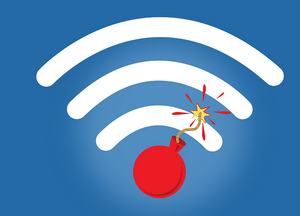CybersecurityCan WiFi networks be completely secure?
There are many ways in which hackers and crackers can break into a Wi-Fi network. It is trivial if the network uses out of date security protocols or weak passwords. But even if the system is set up with the latest security measures, strong passwords, and firewall and malware protection, there are still ways and means that a malicious third party might access such a network.

There are many paths to hacking a wifi network // Source: pixabay.com
There are many ways in which hackers and crackers can break into a Wi-Fi network. It is trivial if the network uses out of date security protocols or weak passwords. But even if the system is set up with the latest security measures, strong passwords, and firewall and malware protection, there are still ways and means that a malicious third party might access such a network. Writing in the International Journal of Wireless and Mobile Computing, researchers from China review the various hacking techniques that might be used and show what defensive measures might best be taken to preclude system compromise.
Rui Guo of the Department of Internet Crime Investigation, at the National Police University of China, in Liaoning Province, China, explains that there is a fundamental security flaw in all Wi-Fi systems. Because of the way Wi-Fi works, the access-point, must listen passively for a signal, a beacon, from devices that may wish to connect whether legitimately or illicitly. This beacon is wholly unencrypted, it has to be because until a connection is made no data can be exchanged to encrypt subsequent communication between the access-point and device.
“This makes Wi-Fi easy to use because you can see networks and their names around you without exchanging some key or password first, but it also makes Wi-Fi networks prone to many kinds of attacks,” explains Guo. Inderscience notes that he has now looked at the top three exploit kits used to break into Wi-Fi: Rogue AP, ARP spoofing, and Wi-Fi MITM. The first point of concern is that none of these kits need physical access to the network, by virtue of its wireless nature, Wi-Fi is vulnerable to man-in-the-middle attacks, whereas a wired network would require the hacker to have a plug-and-socket connection to the network to be able to breach its security.
These “automated cyber weapons” can cause havoc by penetrating and bypassing protections, they can also forge disassociations and deauthorize packets, compromising legitimate communications. Guo describes the protection tools that are available but none of them is perfect and there almost always ways in which a hacker can breach a Wi-Fi network.
— Read more in Rui Guo, “Survey on WiFi infrastructure attacks,” International Journal of Wireless and Mobile Computing 16, no. 2 (2019) (DOI: 10.1504/IJWMC.2019.099026)
